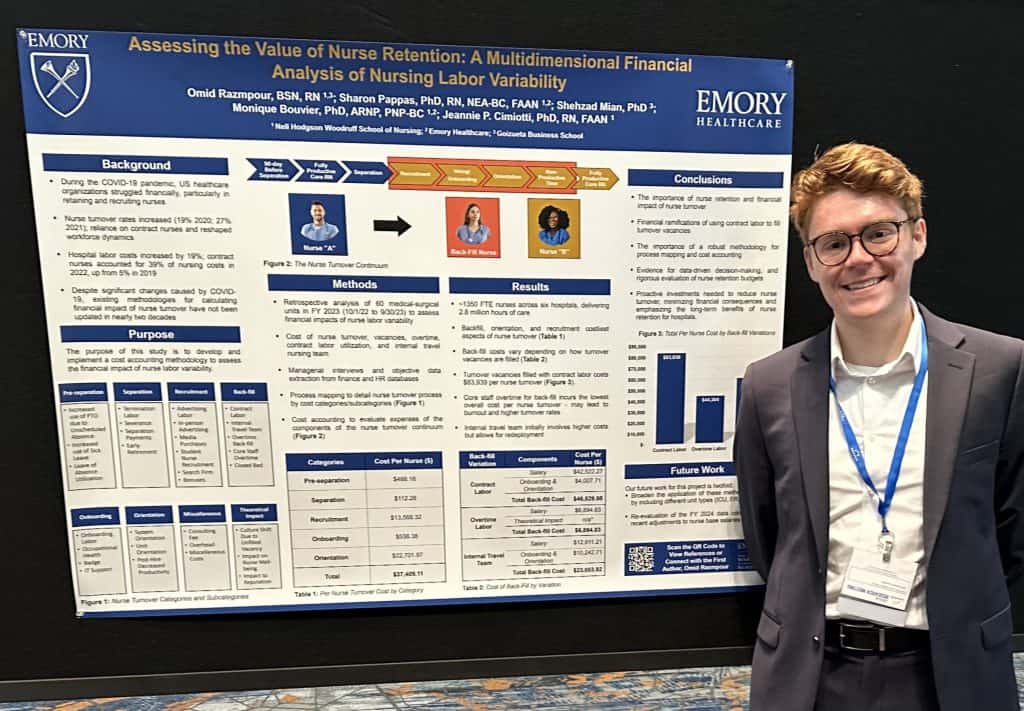Student Spotlight: Meet Omid Razmpour 26MBA
Read in: Español
In our latest student spotlight, we feature Omid Razmpour, a dual PhD/MBA candidate at Goizueta Business School. In this insightful Q&A, Omid shares how his experiences as a nurse during the COVID-19 pandemic shaped his path toward research, advocacy, and business leadership. Join us as he discusses his motivation for bridging the gap between frontline healthcare and administration, the impact of his workforce analytics research, and his mission to improve conditions for nurses through data-driven solutions.

You began your nursing career during one of the most challenging times in recent history—the height of the COVID-19 pandemic. Can you share how that experience shaped your journey from bedside care to research and advocacy through a dual PhD/MBA?
Starting my nursing career during the peak of the COVID-19 pandemic was an experience I could never have fully prepared for. The hospitals were overwhelmed, resources were stretched thin, and every day presented new challenges that tested our limits. Being in the middle of so much pain—witnessing patient after patient succumb to the virus—was incredibly difficult. But what struck me was the widespread suffering among nurses at all levels. As a new graduate, it was not just me feeling the emotional distress of the situation; even the most seasoned nurses were struggling. We were all under immense pressure and lacked the support we desperately needed.
Importantly, the pandemic did not create these issues; it exposed and intensified existing problems within our healthcare system. I began to question why we were not provided with what we needed to care for our patients effectively. Why were we, as nurses, left to bear such a heavy burden without the necessary backing? What are the short and long-term implications of this burden? These questions drove me to pursue a PhD focused on uncovering the reasons behind this systemic lack of support. As I delved deeper into my research, I realized that many of the challenges nurses face are tied directly to the business aspects of healthcare. Whether we like it or not, healthcare operates as a business, and financial considerations often drive decision-making. Understanding this, I saw that I needed to speak the language of those making the decisions to advocate effectively for change.
This realization led me to complement my PhD with an MBA. Through the Full-Time MBA program, I have strengthened my financial modeling skills and gained a deeper understanding of strategy, marketing, economics, accounting, and entrepreneurship. Drawing on my clinical experience and business expertise, I aim to bridge the gap between frontline nursing and healthcare administration. My research and business objectives center on workforce financial modeling and nursing-related operational efficiency, to create solutions that deliver value to nurses, patients, and healthcare organizations alike. By examining the financial and operational dimensions of nursing workforce management, I seek to identify inefficiencies, uncover cost-saving opportunities, and improve the overall work environment for nurses.
My personal and career goals are driven by a deep commitment to ensuring that current and future nurses are supported in ways that help them avoid the emotional and mental challenges I have experienced. We deserve more support, better resources, and a system that acknowledges and addresses our needs. By demonstrating how investing in nursing can lead to positive financial outcomes, I hope to convince decision-makers to prioritize the well-being of nurses. After all, when nurses are supported, patient care improves, and the entire healthcare system benefits.
You developed the RETAIN Framework© to quantify nurse turnover costs. What inspired you to create this model, and what do you believe are the root causes of nurse turnover and the solutions that could make a meaningful difference in the healthcare industry?
During my doctoral research, I partnered with Emory Healthcare to develop the RETAIN Framework© (Retention Evaluation and Turnover Analysis for the Investment in Nursing), a tool designed to address nurse turnover—a persistent issue that undermines healthcare systems. Turnover disrupts team dynamics, drains resources, and negatively impacts patient care. However, many organizations struggle to quantify its true costs or address its underlying causes. The RETAIN Framework© bridges this gap by translating the multifaceted impacts of turnover into clear financial and operational metrics. Providing actionable insights empowers healthcare leaders to craft data-driven strategies that prioritize workforce stability while aligning with organizational goals.
At its core, the RETAIN Framework© tackles the root causes of turnover by linking them to objective outcomes. High workloads, resource shortages, and stressful environments create unsustainable conditions that drive dissatisfaction and attrition among nurses. These challenges, left unaddressed, perpetuate a cycle of burnout, increased turnover, and operational strain. The RETAIN Framework© uses data analytics to illuminate these systemic issues, enabling leaders to understand how workforce dynamics intersect with financial performance. Alongside this framework, my colleagues and I are currently developing a workforce analytics project that complements this framework. This initiative delves deeper into the drivers of turnover, employing advanced data modeling to identify trends and patterns. By analyzing these factors in conjunction with financial insights, we aim to equip healthcare organizations with a holistic understanding of their workforce challenges. Together, the RETAIN Framework© and the analytics project provide a comprehensive approach to addressing nurse turnover by aligning financial imperatives with operational improvements.
These projects are impactful because they connect the human and financial aspects of nurse turnover to drive meaningful action. Translating abstract challenges into tangible metrics enables healthcare leaders to develop strategies that stabilize their workforce, improve operational efficiency, and enhance patient care. Through a combination of financial insights and data analytics, this approach addresses the root causes of turnover, fostering systemic change that benefits nurses, patients, and healthcare systems alike.

Choosing the right business school is a big decision, especially with a nontraditional background like yours. What drew you to Goizueta Business School, and how has the experience supported your unique career goals?
Building on my research work and my commitment to addressing systemic issues in nursing, I recognized that gaining a deeper understanding of business principles was essential to drive meaningful change. Choosing the right business school was a significant decision, especially given my nontraditional background in nursing and healthcare. Goizueta Business School emerged as the perfect fit for several reasons.
Firstly, its strong connection to the healthcare sector in Atlanta, particularly with Emory Healthcare, offered a unique opportunity to bridge my clinical experience with advanced business education. This synergy aligned perfectly with my goal of integrating healthcare and business to advocate more effectively for nurses. Being selected as a Robert C. Goizueta Center for Entrepreneurship and Innovation (CEI) Fellow was another major factor. The fellowship combines everything I am passionate about by allowing me to explore my own entrepreneurial ventures while engaging with various organizations in Atlanta’s vibrant startup community. It provides a platform to integrate my dedication to healthcare with innovation and entrepreneurship. Additionally, I had already established strong connections with amazing professors during my time at the School of Nursing for my PhD. The opportunity to continue learning from them and benefit from their mentorship was incredibly appealing and reinforced my decision to choose Goizueta.
Ultimately, coupled with its reputation for excellent education, job placement, networking opportunities, and exceptional classmates, Goizueta Business School has provided the resources and environment needed to support my unique career goals. The experience has not only enhanced my financial modeling skills but also broadened my understanding of strategy, marketing, and entrepreneurship—all critical for advancing my efforts to improve nurse retention and advocate for systemic change in healthcare.
Many students at Goizueta Business School come from diverse and nontraditional backgrounds. What advice would you give to others considering an MBA, especially those coming from fields outside of business?
When I started at Goizueta Business School, I came from a career with no formal business experience. Naturally, I felt a bit of imposter syndrome. I wondered if I would be able to keep up with classmates who had years of experience in finance or consulting, and I worried that my background might somehow put me at a disadvantage. What I quickly learned, though, was that my background actually brought something valuable to the table. Coming from a nontraditional field allowed me to approach business concepts in a unique way, adding a different layer to classroom discussions. My experiences in healthcare gave me real-world examples that often connected well with the theories we were studying, making the material more practical and relevant. I found that the diversity of backgrounds in the room did not just make things interesting—it added depth and made the learning process more meaningful for everyone.
I was also pleasantly surprised to discover that I was not alone in this experience. Goizueta has a good number of students from fields outside of business, including others from healthcare, education, and various industries. Realizing this helped me feel more comfortable and gave me the confidence to fully engage. There’s something reassuring about knowing there are others who share similar feelings or who are also adapting to a new field. The supportive, inclusive culture at Goizueta really stands out, and it helped me see that the program is built to welcome people from all kinds of backgrounds.
For anyone from a non-business background considering an MBA, my advice would be to embrace where you come from. Do not feel pressured to fit a traditional mold or hide your experiences outside of business; instead, recognize that your perspective is a unique asset. Your experiences bring a different viewpoint that can add real value to discussions, helping you and your classmates make better sense of the material. Dive into discussions, share your insights, and do not be afraid to ask questions or bring up examples from your field. You might be surprised by how much your background resonates with others, even if it’s different from theirs.
Another important thing to remember is that business schools like Goizueta actively seek out students with diverse experiences because they understand that this variety makes the learning environment richer for everyone. You do not need a traditional business background to contribute meaningfully to the program—in fact, it is often the students from nontraditional paths who bring new ideas and make the learning more dynamic. By bringing your unique perspective to the program, you are not only enriching your own education but also helping create a more well-rounded experience for everyone involved.
In the end, pursuing an MBA with a nontraditional background can be incredibly rewarding. You will find yourself learning a new language and skill set while building on the strengths you already have. You will also connect with others who may be outside of your industry but who share your desire to grow and push boundaries. It is a chance to expand your horizons and bring new value to both your career and the community around you.

What excites you most about the future of healthcare and the role business can play in transforming the field?
What excites me most about the future of healthcare is the chance to break down outdated ways of doing things and build a system that truly works for everyone involved. Healthcare has been running on processes that do not prioritize efficiency or financial viability, and that needs to change. By bringing in fresh, business-minded approaches, we can start to shift from merely reacting to problems as they arise to creating proactive strategies that prevent issues before they start. Integrating business principles into healthcare means we can take a thoughtful, strategic approach to concepts like resource allocation to workforce management. Imagine a system where we are not just scrambling to fill staffing gaps or balance budgets at the last minute but actively planning for the needs of both patients and healthcare providers. When we make decisions based on solid data and financial insights, healthcare organizations can operate more smoothly, and both staff and patients feel the difference.
What really drives me is knowing that these changes can create a better environment for healthcare workers, especially nurses. When we address core issues—like heavy workloads, burnout, and staffing issues—with thoughtful, business-informed solutions, we build workplaces where nurses feel supported, valued, and empowered to give their best care. This is not only about data and metrics; it’s about using those insights to drive real, meaningful change and spark conversations that lead to tangible improvements in people’s lives. I believe the future of healthcare will combine the best of clinical expertise with business insight to create a system that is not only effective but also compassionate and sustainable. That is the kind of healthcare I want to help build—a system where everyone, from patients to providers, feels the benefit of a smarter, more thoughtful approach.
Interested in exploring Full-Time MBA opportunities? Learn more about Goizueta’s Full-Time MBA program.
Omid Razmpour, BSN, RN is a PhD/MBA student at Emory University with a background in nursing and a focus on workforce analytics and retention strategies. As the creator of the RETAIN framework© for calculating the cost of nurse turnover, he brings together clinical experience and business expertise to tackle the financial and operational challenges of managing the nursing workforce. Omid is a strong advocate for investing in the nursing workforce to improve patient care and healthcare outcomes.
Read in: Español
